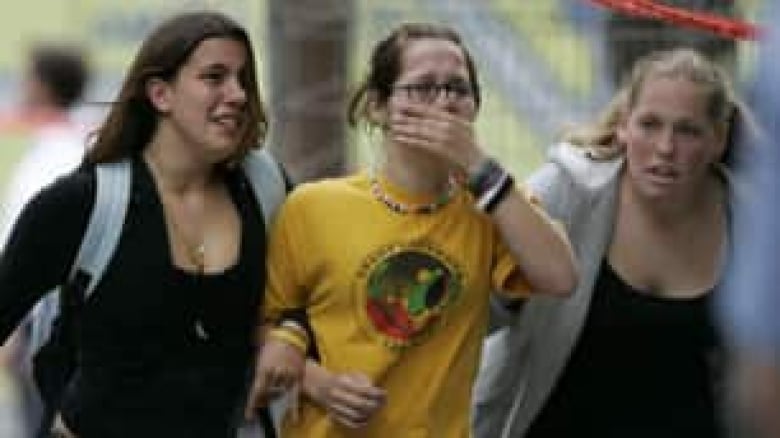Dawson shooting spurred mental disorder spike
Researchers call on Quebec government to launch new crisis-management system

A groundbreaking study on fallout of the 2006 shooting at Dawson College in Montreal reveals that nearly one-third of students and staff suffered from psychological trauma in the years after the event.
The study, released Thursday in Montreal, said 30 per cent of people surveyed suffered post-traumatic stress disorder, a major depression, alcohol dependence or a social phobia as a direct result of what they experienced.
The rate is two to three times higher than the general population, said Warren Steiner, a member of the research team.
'We found very high levels of problems of major depression, anxiety disorders and substance abuse. ' — Warren Steiner, research team member
The study also calls on the Quebec government to launch a new crisis-management system to tend to the needs of victims who may be suffering mentally, not just physically, in the aftermath of an event such as a school shooting.
"It is crucial that we use what we've learned from these experiences to improve the care available to those in need in the event that this should ever happen again," Steiner said.
On Sept. 13, 2006, Kimveer Gill stormed the downtown campus with three guns and opened fire.
The bullets struck and killed Anastasia De Sousa, an 18-year-old business student. Nineteen other people were wounded before Gill turned the gun on himself.
Panicked students and staff barricaded themselves in classrooms and closets or fled the school. Downtown streets were filled with the sounds of screams and sirens.
The three-year study involved interviews, online surveys and focus groups with close to 1,000 Dawson students and staff.
The study, which was funded by the Quebec government, was conducted by researchers at the McGill University Health Centre and Louis-H. Lafontaine Hospital.

De Sousa family applauds study
Anastasia's mother, Louise De Sousa, was on hand for the announcement, and said the recommendation for all schools to have a crisis-management system was most important to her.
"Anybody else, any other schools that have a tragedy or anything to deal with — [Dawson] acted so fast," she said. "I honestly was impressed with how the school acted on taking care of all students that were here."
De Sousa said she hopes the study will help some good come out of her daughter's death.
Nearness to shooting increased the trauma
Steiner said researchers found that the likelihood of someone being traumatized skyrocketed the closer they were to the shooting itself.
"We were able to demonstrate that anyone who was in close proximity to the shooting — meaning witnessed it, heard the shots or was locked in an office hidden away — had three or four times a risk of developing a psychiatric disorder," said Steiner.
Overall, 13 per cent of the students and staff surveyed sought professional help after the shooting.
An additional 14 per cent went to the internet in search of guidance.
Researchers call for emergency plans
The study noted that Dawson College had no emergency crisis plan at the time of the shooting, and that caused delays in the response from medical officials.
"We had to put together intervention plans on the spot. Because of that, there was some delay in our intervention," said Steiner.
He said support services for student and staff members also ended too quickly.
"We found very high levels of problems of major depression, anxiety disorders and substance abuse that extended well beyond the [eight month] period for which we provided service," said Steiner.
The study makes seven recommendations:
- All schools in the province should have their own crisis management plans in place.
- All hospitals should designate a special treatment zone where victims with psychological stress can be treated.
- The province should set up an emergency intervention program called SECURE to co-ordinate response efforts.
- An expert panel should create a crisis tool-kit for schools on what to do in the event of a shooting.
- Workers should have easier access to mental health treatment.
- The Quebec government should cover the cost of psychiatric care for an extended period.
- A follow-up plan should be developed to learn from any future incidents.
The study is first in the world to shine light on the true psychological impact of a school shooting, Dawson College director general Richard Filion said.
"There were several school shootings in the last 10 years, but there was no real and systematic and scientific research on, 'OK what happened, really?'" he said.
Filion said the fallout on the people who were not physically harmed cannot be ignored.
Dawson College serves about 10,000 students.
The Quebec government is now reviewing the report's recommendations.